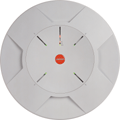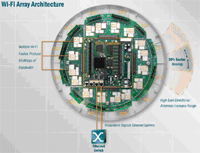Liverpool Women’s get WiFi ticket to roam
- 14 May 2007
Joe Fernandez
 More than 13 million UK homes and small and medium-sized businesses now have Wireless enabled internet connections. Research taken in February shows that 21% of all UK adults owned a wireless enabled laptop in February and over one third of those had used public Wi-Fi hotspots to access the internet – so it makes sense for hospitals to look into embracing the technology themselves.
More than 13 million UK homes and small and medium-sized businesses now have Wireless enabled internet connections. Research taken in February shows that 21% of all UK adults owned a wireless enabled laptop in February and over one third of those had used public Wi-Fi hotspots to access the internet – so it makes sense for hospitals to look into embracing the technology themselves.
By using wireless technology, clinicians can access patient notes and diagnostic images remotely, using hand-held devices and add to them without having to go back and forth. One trust looking to embrace this technology is the Liverpool Women’s NHS Foundation Trust.
Business Case for installation
Liverpool Women’s Trust have been using e-prescribing in all but one of its in-patient clinical areas since 2004 through its Meditech EP system, built with technology partners FileTek UK.
The trust wanted to extend this service to all parts of the hospital, and as the e-prescribing was compatible with their Meditech patient administration system, and had the functionality to be viewable on mobile devices, they asked the board to invest in a new Wi-Fi Network.
Dr Zafar Chaudry, director of information management and technology at the trust, told E-Health Insider: “We felt we needed to move e-prescribing out throughout the trust and with the PAS compatible with viewings on mobile devices, we took the decision to make the Liverpool Women’s hospital a wireless hospital for both patients and staff. Not just in terms of viewing, but for printing and document managing and so on.”
With a business case approved and money to spend, the trust issued a tender to find a suitable Wi-Fi provider that could provide them with a fast and secure network for both patients and staff to simultaneously use.
After a lengthy tender process, the trust chose a bid from Wireless LAN Source, the UK’s largest provider of wireless internet equipment and accessories, to install 26 Wi-Fi Arrays – the technology used to integrate up to 16 Wi-Fi radios with an onboard wireless local area network controller, Gigabit Switch, Firewall, and a dedicated Wi-Fi Threat Sensor into a single device.
The technology chosen came from US-based Xirrus, who are high-performance Wi-Fi specialists for large areas where there are large user areas to cater for.
Dr Chaudry said: “Xirrus provides a Wi-Fi infrastructure that goes beyond a sea of access points and controllers, one that will provide the wireless foundation for a wide range of applications enabling us to truly mobilize our staff to improve patient care.”
Benefits of Wi-Fi
So why go to all the expense of splashing out on an entire new wireless network?
“Wireless access makes our lives extremely easier. This is especially true for our medical staff as it makes them more mobile and hence more able to accurately treat a patient from the bedside. It means that we can make additions to patient notes using remote access on wireless devices and it means that we’ll have all the necessary information at the touch of a button,” said Dr Chaudry.
As long as the system was secure, reliable and compatible with the hospital’s existing infrastructure, it could make treating patients a lot more easier, he added.
“The main benefit from creating a wireless network is as the ability to be able to use the PAS on mobile devices is already there, clinicians can use their remote devices to know that their patient has arrived for their appointment, and can view their medical history while doing the rounds. Once with the patient, the clinician is better equipped to do their job and can also print electronic prescriptions off of the many wireless printers we have.”
The trust will be implementing PACS in June and the system will also work on the wireless network, so images stored are viewable on mobile devices.
According to Dr Chaudry, the savings in staff time alone could equal an estimated £300,000 over five years.
“It’s not just clinical staff who will benefit, but also non-clinical staff. The linkage with our Meditech PAS means patient records, order entry and clinical documentation at the bedside. For the non-clinical staff, they can remotely track patient notes, look up their network account, send e-mails remotely, look at file share documents and use the hospital’s intranet.”
Overall, the biggest benefit is that with the use of wireless technology, the trust will be “as paperless as we can get with strong document management and the ability to work away from a standard computer maximizing patient care and everything will be manageable using single sign on.”
Equally, patients will benefit from being able to use the internet whilst they are recovering or waiting for treatment.
“As more and more people move towards remote working, and the use of the internet for both business and leisure, we felt it would be a good idea to offer patients a wireless service as well. A separate connection has been set up for them, so that they can hire a wireless connection with a unique passcode and check what they want to know using the internet – within reason, of course. Effectively, we have made the hospital a Wi-Fi hotspot.”
The system
The solution the trust has gone for will provide 54Megabytes per second data rate connections throughout the hospital.

The trust is deploying 26 Wi-Fi Arrays similar to the one above, each array will provide a connection for up to 192 users.
The trust will use two different connections, each secure and stable – one for patients and one for staff.
Each array will have a unique service set identifier (SSID) which will protect the connection from unauthorised access.
Users will be given the SSID for their own connections, and these will be changed every 30 days.
Patients will purchase a wireless card, with a unique SSID to get onto their connection and these will be restricted to a certain period of time, similar to the systems used in airports and pub ‘hotspots’.
John DiGiovanni, director of marketing for Xirrus told EHI: “Security concerns for the trust are paramount and it was essential that we could guard against intrusion and issues with reception. We offer a 24/7 basis monitoring scheme and we have access if we need to mitigate any issues or risks. The system has a very high level of authentication and encryption.”
The Pilot
Last month, the trust began piloting the wireless system to ensure the solution would provide the necessary coverage and bandwidth to support the hospital’s requirements for a high performing, reliable network.
Working with their UK partners, Wireless LAN Source and Dell, Xirrus put the back end infrastructure in place and installed three arrays.
The hospital used a few of its existing laptop computer carts and clinician’s PDA’s to test the connection.
Dr Chaudry said: “The system has been working well. We have been able to access the PAS and EP system from our PDA’s and have been able to test out bits and pieces of wireless working. What was amazing for us was that once we had the connection in place, we found that there were a number of wireless devices already in the hospital and surrounding areas which would make a transition to wireless remote working a lot easier for us to do.”
The pilot has been a benchmark test for the new network. The trust had to check that there were no rogue access points or any security threats from intrusions, especially given the nature of the information that was being stored.
“Our IT team and the developers worked extensively together to ensure that governance rules were met and that patients or residents could not accidentally gain access to the system and come across private and confidential data. Anyone logging onto the Xirrus networks needs to have a valid network key, which would in turn generate a Xirrus verification certificate. Without that, you cannot log onto the system.”
The Future
Full connection to the system is expected to take between 12 and 18 months, according to Xirrus. In that time, Dr Chaudry says the trust will invest in more Wi-Fi enabled laptop computer carts for both patients and staff.
At present, staff are using their PDA’s to view information, but there are concerns that the screen is simply too small.
Future utilisation of the Wi-Fi network will involve tablet PCs and voice over Wi-Fi handsets delivering electronic charting capabilities amongst other things.
The deal with Xirrus includes five years support sand maintenance and Dr Chaudry says it will ‘improve communication, patient care and the efficiency of the hospital staff.’




